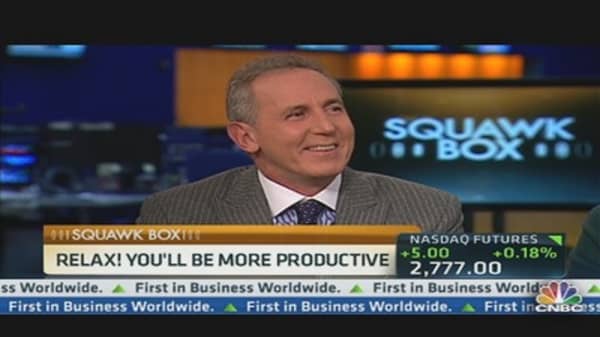Schwartz wrote about the need for this "paradigm shift" over the weekend in The New York Times and then explained his thesis in Monday's "Squawk Box" interview. "If you can focus and concentrate energy for … short periods of time, so let's say 60 to 90 minutes. But you're fully focused, you're not distracted, then you can get more done in less time."
(Read More: A 30-Hour Working Week: Could It Happen in Germany?)
At The Energy Project, Schwartz said he practices what he preaches. "Nobody works after 6[p.m.] We don't ask people to email on the weekends or in the evenings. We get four weeks of vacation as soon as you start."
He added, "We have socialized our clients to realize it's good for them, it's good for us." His clients include Google, Ford, and Wells Fargo.
"We have undervalued all forms of renewal and recovery," he argued. "So when you are really rested or renewed, you're capable of higher cognition, of greater creativity."
(Read More: U.S. Productivity Declines Most in Nearly 2 Years)
Schwartz, author of "The Way We're Working Isn't Working" and more recently "Be Excellent at Anything," tried to dispel the notion that "one less hour of sleep gives us one more hour" to be productive. "That's nonsense," he claimed. "What it gives us is one more hour to by be partially productive, because you're tired."
Ideally, he said, "You need short breaks during the day. You need real weekends. You need some periods of three-day vacations and a long vacation."
And a good night's sleep, he added.
—By CNBC's Matthew J. Belvedere; Follow him on Twitter @Matt_SquawkCNBC




